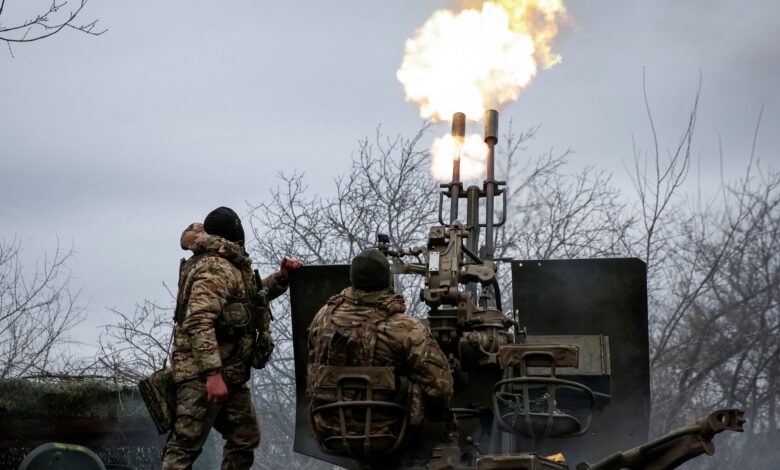EU agrees five billion euro boost for military aid to Ukraine

The move provides a welcome boost for Kyiv as support from its other major backer, the US, wavers and its outgunned forces struggle to hold back Russia.
European Union countries have agreed to provide 5 billion euros ($5.48bn) for military aid to Ukraine as part of a revamp of an EU-run assistance fund, handing Kyiv a timely boost as its forces struggle against Russia’s invasion.
Ambassadors from the EU’s 27 member countries agreed to the overhaul of the European Peace Facility (EPF) fund at a meeting in Brussels on Wednesday after months of wrangling, with EU heavyweights France and Germany at the centre of much of the debate.
“The message is clear: we will support Ukraine with whatever it takes to prevail,” EU foreign policy chief Josep Borrell posted on social media platform X after the decision.
The fund operates as a giant cashback scheme, giving EU members refunds for sending munitions to other countries.
France, a strong promoter of European defence industries, had insisted on a strong “buy European” policy for arms eligible for refunds. Other countries argued that such a requirement would inhibit efforts to buy worldwide to get weapons to Ukraine quickly.
Germany, by far Europe’s biggest bilateral donor of military aid to Ukraine, had demanded donations be taken into account in determining the size of countries’ financial contributions to the fund.
Diplomats said compromise was eventually reached allowing flexibility on the “buy European” rules and taking into account part of the value of bilateral aid when calculating members’ financial contributions.
“This is yet another powerful and timely demonstration of European unity and determination in achieving our common victory,” said Ukrainian Foreign Minister Dmytro Kuleba.
“We look forward to the final decision being approved at the next EU Foreign Affairs Council meeting.”
The final text said the scheme should give priority to the European defence industry while “exceptionally allowing for flexibility in cases where it cannot provide within a timeframe compatible with Ukrainian needs”.
The compromise will allow the fund to help finance a Czech initiative to buy hundreds of thousands of desperately needed artillery shells from countries outside Europe, according to diplomats.
The EPF has already been used to allocate some 6.1 billion euros ($6.7bn) to military aid for Ukraine, according to the EU.
Borrell proposed creating a new cash pot last year specifically for aid to Kyiv – the Ukraine Assistance Fund – inside the EPF, with a budget of up to five billion euros per year for the next four years.
That prompted a prolonged debate about rules for future aid, eventually leading to Wednesday’s agreement.
The compromise included measures to satisfy Hungary, which has previously blocked payouts from the EPF and said it does not want its contributions to finance arms for Ukraine.
Under the deal, its contributions will be used to fund military aid to other countries, according to EU officials.
“Ukraine needs more arms and equipment, we will provide them in sufficient quantities and in a coordinated manner,” said Hadja Lahbib, the foreign minister of Belgium, the current holder of the EU’s rotating presidency.
“Europe is true to its commitments. Our freedom is at stake.”
The announcement of the latest funds for Ukraine has come as Kyiv’s forces are under pressure along the front line in the face of ammunition shortages.
The United States on Tuesday announced a new $300m weapons package for Ukraine, but a further $60bn in funding remains stalled by Republicans in Congress.
Warnings have grown in Europe that a failure to keep up support for Kyiv could see it ultimately defeated and that an emboldened Kremlin might then attack other countries.
The EU is pushing to bolster weapons and ammunition production by its defence industry, but two years into the war, it is still struggling to ramp up output.
The bloc is set to fall well short of a promise it made a year ago to supply Ukraine with a million artillery shells by this month.
Meanwhile, Russia has stepped up its arms production by putting its economy on a war footing and has received major deliveries of weapons from Iran and North Korea.



